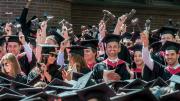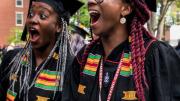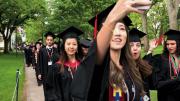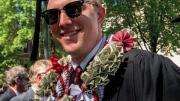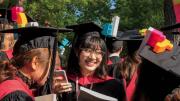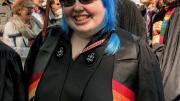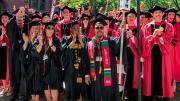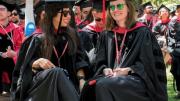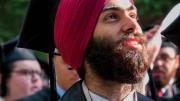Absolutely stunning conditions—brilliant blue sky, low humidity, comfortably breezy in the mid 60s, spring-green leaves and lots of flowering things—made for a picture-perfect 367th Commencement on May 24. With Harvard at its loveliest as backdrop, two narratives unspooled, wrapping around the week’s graduations and reunions. One focused, optimistically, on the transition within the University (President Drew Faust’s valedictory, the welcome to her successor-elect Lawrence S. Bacow—the first routine Massachusetts Hall transition since Neil L. Rudenstine concluded his service in 2001). The other, wary, was propelled by the rising disregard for Veritas in the world beyond fair Harvard (prompting responses that ranged from calls for outright resistance to advancing a positive vision for the country’s way forward).
Passing the Baton
The Corporation’s senior fellow, William F. Lee, and Faust herself set the stage for the succession at the least political occasion of Commencement week, the Wednesday night dinner for honorands in Annenberg Hall. Lee toasted her for leading Harvard through unprecedented challenges with “courage, grace, and deep institutional conviction.” She, in turn, thanked those who made her job possible, and a joy: members of the governing boards; “my beloved Council of Deans, my academic cabinet”; departing deans Liz Cohen (Radcliffe), James Ryan (Graduate School of Education), and Michael Smith (Faculty of Arts and Sciences); and her Mass Hall team. Official recognition gave way to a personal one as Faust then focused on “my interlocutor, my defender, my resident faculty voice”—Charles Rosenberg, Monrad professor of the social sciences emeritus, her husband—who, she continued, was always ready with a quip to deflate creeping grandiosity. He received a robust ovation. After lauding the honorands, Faust offered a final toast “to my esteemed friend and successor, Larry Bacow.”
During the exceptionally orderly proceedings Thursday morning, the Medical School’s George Daley made the first notable tweak to the decanal scripts for presenting degree candidates, adding, “Madam President, we thank you for your years of distinguished service, we thank you for your wise leadership.” No one seemed to mind the freelancing. There might have been a whiff of politics when the J.D.s’ turn came: as new dean John F. Manning pronounced the ritual words about the students whose studies point them toward “promoting the rule of law,” and Faust responded about “those wise restraints that make us free,” the traditional text seemed to assume a new, contemporary force.
After the honorands received their actual degrees (students have to wait until later in the day), Provost Alan Garber, showrunner, interjected, “Before we conclude, I note that this ceremony marks Drew Faust’s eleventh and final” time presiding over the Morning Exercises. “Words cannot adequately express our gratitude for her extraordinary leadership,” he continued; he invited applause to do that work instead. There was plenty. As Faust put her hand over her heart, Bacow, to her right, nodded and applauded, and president and president-elect embraced—and applauded each other.
Offstage, Faust, who has emphasized the importance of the arts and of interpreting visual evidence in a digital age, was the subject of a Widener exhibit, “President Drew Gilpin Faust: Eleven Years of University Growth, Reinvention, and Inclusion”: two corridors of highlight photos, suitably placed for viewing by guests at the chief marshal’s spread in Loker Reading Room.
Back outside for the Harvard Alumni Association’s afternoon hoopla, Faust received a final formal encomium, a Harvard Medal, purportedly a surprise. Given her lifelong engagement with civil rights, and her strong support for the guest speaker, U.S. Representative John R. Lewis, LL.D. ’12 (whom she had hailed Wednesday evening as “an American hero, my hero”), Faust may especially treasure his opening salute to “the tenure of a great leader.” He continued, “Madam President, thank you for being a friend. But more importantly, thank you for using your office to move Harvard toward being a more all-inclusive institution.”
The stage was impeccably set for Faust’s valedictory speech. The University is throwing her a community farewell party on June 28—but it would be hard to top this radiant Commencement day as a parting gift.
The Spirit of ’68
The wider world loomed during the week, too, of course, eliciting multiple responses, from subtle to nearly strident.
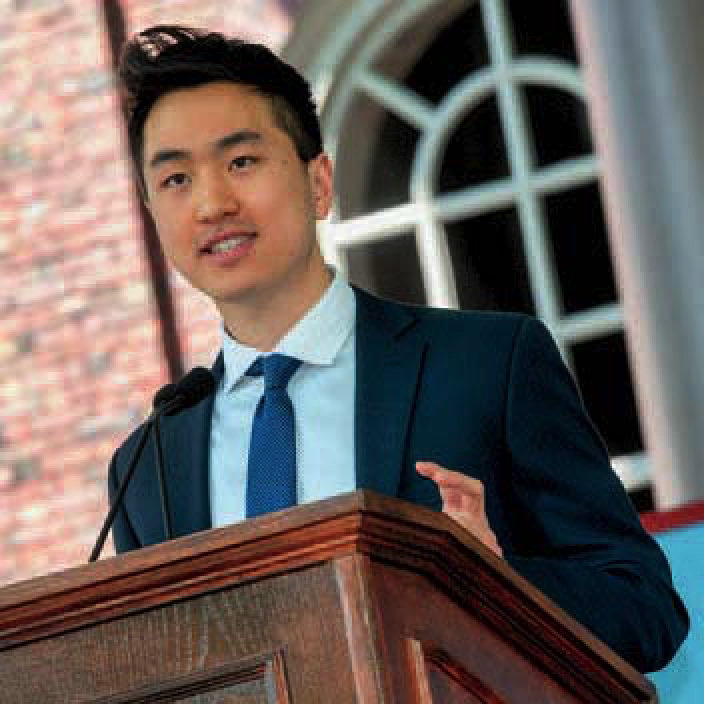
Jin Park
Photograph by Jim Harrison
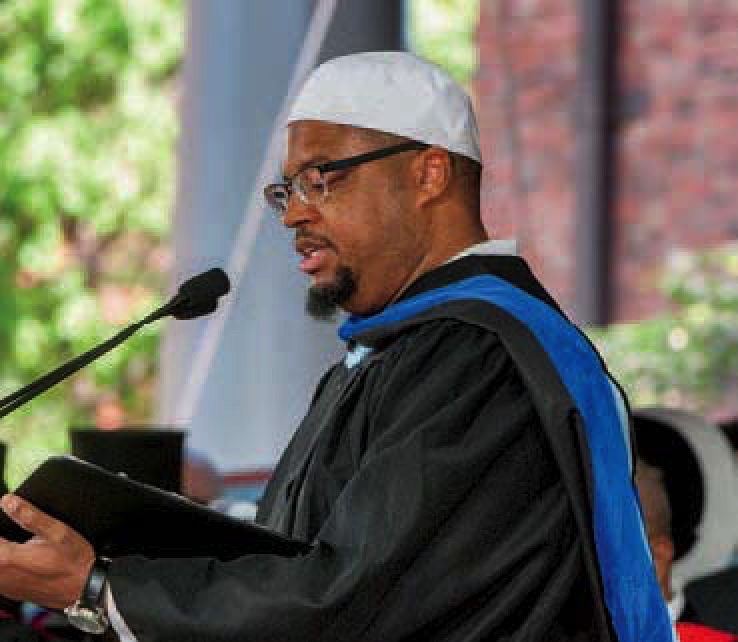
Khalil Abdur-Rashid
Photograph by Jim Harrison
The Crimson rainbow. In the context of politics-by-shouting, some significant statements are nonverbal. The University took every opportunity to model, quietly, the kind of diverse community it cherishes, and aspires to strengthen. Jin Park ’18, the Harvard Orator at the College’s Class day, is an undocumented student whose parents, Korean immigrants, work in restaurants and nail salons in New York. Thursday morning, Khalil Abdur-Rashid, who became the University’s first full-time Muslim chaplain last summer, offered the opening prayer.
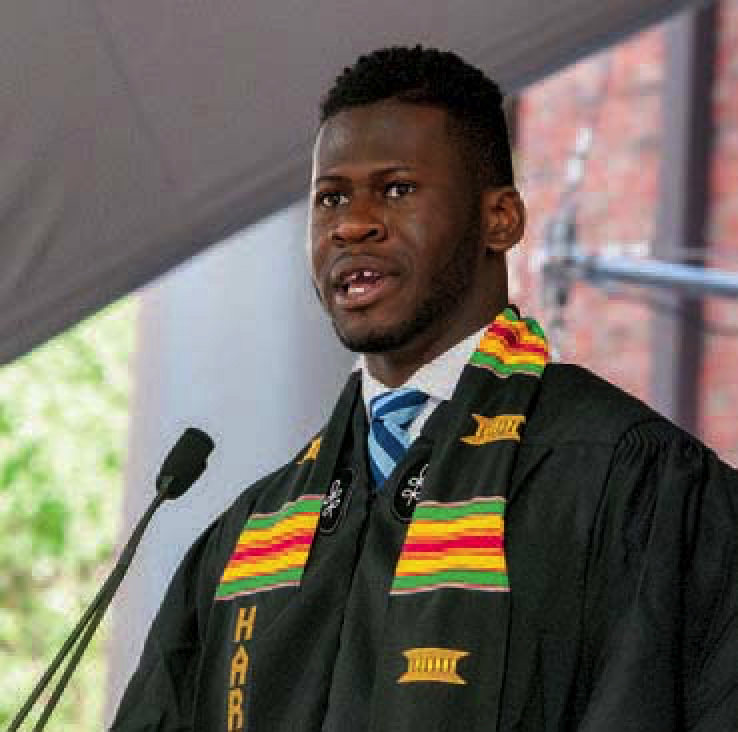
Christpher Egi
Photograph by Jim Harrison
The Senior English orator, Christopher E. Egi ’18, is both a Harvard basketball star and the son of two Nigerian immigrants who was raised in Canada. The Graduate School of Arts and Sciences conferred a Centennial Medal on Guido Goldman ’59, Ph.D. ’70—an immigrant whose family fled Nazism and who became (gasp, given current transatlantic relations) a full-fledged Europeanist. The separate subtexts told a single story.
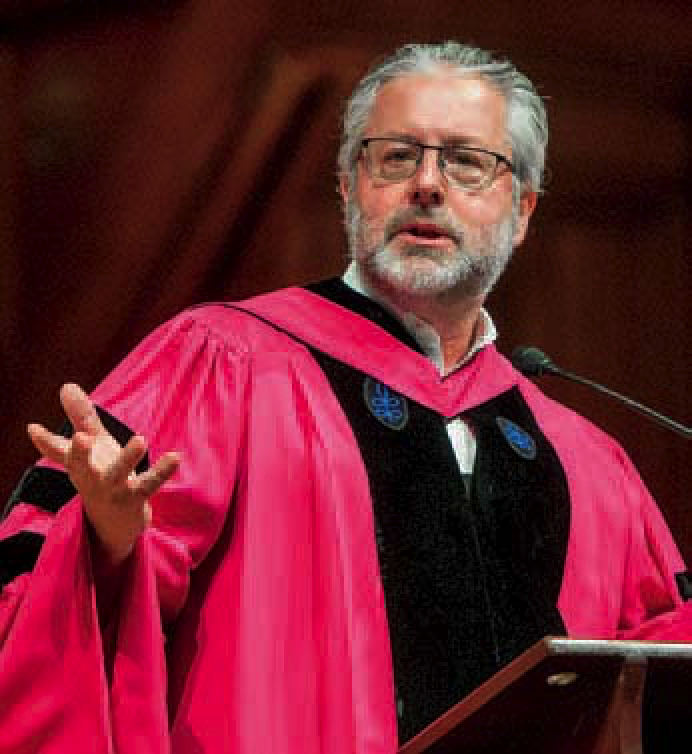
Neil Shubin
Photograph by Jim Harrison
The pursuit of truth. A prominent theme of the actual speeches was the University’s fundamental commitment to the search for truth. Paleontologist Neil Shubin, Ph.D. ’87, the Phi Beta Kappa orator: “We live in an age where people talk of alternative facts, fake news, and junk science. Those adjectives—‘alternative,’ ‘fake,’ and ‘junk’—make it ever more important that we gain the ability to take a cold look at marshaling and evaluating evidence in making decisions.” Faust, the Baccalaureate: “[Y]ou found yourselves at the heart of an institution whose motto is ‘veritas,’ yet you were in a climate where ‘alternative facts’ fuel public discourse and ‘post-truth’ was the Oxford English Dictionary word of the year.” Writer Chimamanda Ngozi Adichie, College Class Day speaker: “If I were asked the title of my address to you today, I would say, ‘Above all else, do not lie.’ Or ‘don’t lie too often’—which is really to say, ‘Tell the truth.’”
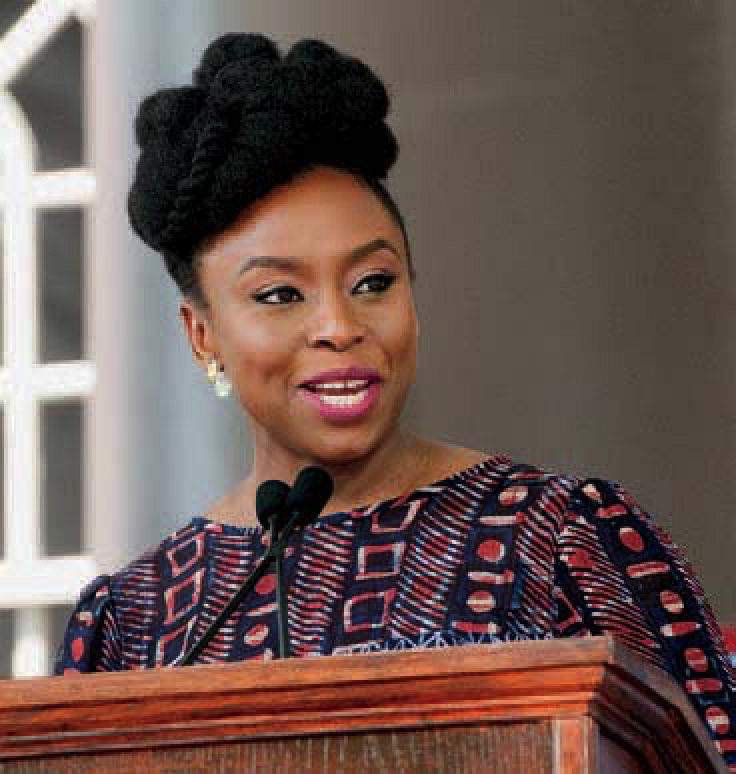
Chimamanda Ngozi Adichie
Photograph by Jim Harrison
Among those truths, politician John Kasich, the Republican governor of Ohio, speaking Wednesday at the Kennedy School class day, stressed faith and inclusion: “Christians and Jews and Muslims all basically have the same view of human life. Human life is special.” And Egi drew a disturbing connection between Langston Hughes’s “raisin in the sun” and Michael Brown’s body left to lie “under the hot Missouri sun in the streets of Ferguson for eight hours. Eight hours.”
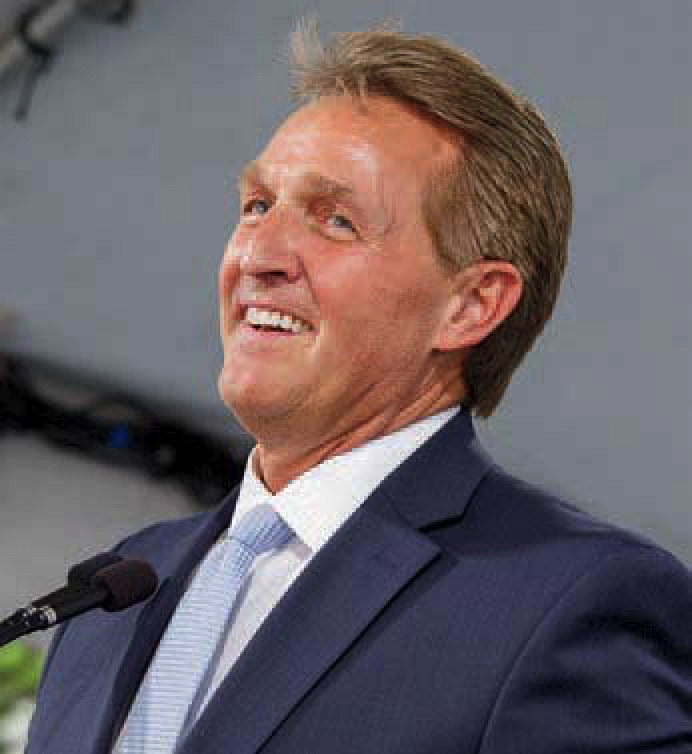
Jeff Flake
Photograph by Heratch Photography
Taking action. From there, it was a short step to sharp calls for action. From the right, U.S. senator Jeff Flake, Republican of Arizona, addressing the law students, decried the “America First crowd” and fellow members of Congress for lying “utterly supine in the face of the moral vandalism that flows from the White House daily.” His succinct summing-up argument was, “simply put: We may have hit rock bottom.” Offering a bit of professional counsel, from experience (he is not seeking reelection), Flake advised the barristers-to-be to do the right thing, “even if it means risking something very important to you, maybe even your career, because there are times when circumstances may call on you to risk your career in favor of your principles. But you, and your country, will be better for it. You can go elsewhere for a job, but you cannot go elsewhere for a soul.”
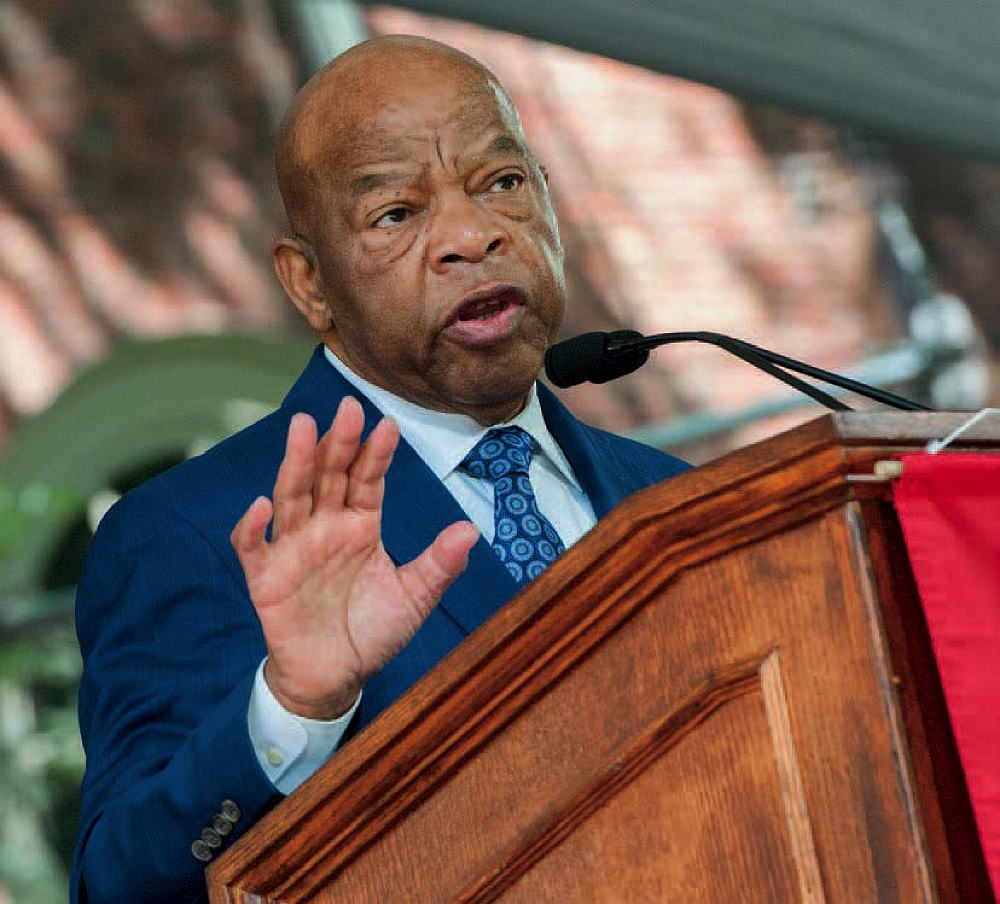
Jeff Lewis
Photograph by Jim Harrison
Representative Lewis, from decidedly different political and cultural traditions, beseeched the new graduates to lead, and to vote. “We must save our country,” he thundered. “We must save it. We must save our democracy. There are forces in America today, and around the world, that are trying to take us to some other place.”
Occupying what might qualify as the middle ground today, the education-school’s speaker, John Silvanus Wilson Jr., M.T.S. ’81, Ed.M. ’82, Ed.D. ’85—past president of Morehouse College, now on leave as a Harvard Overseer to serve as adviser to Faust and Bacow on inclusion and belonging—drew on his “teacher (Mom)” and “preacher (Dad)” background and his degrees to depict a joinable moment when “Teachers are marching…holding strikes and walkouts for…the freedom to teach without being undermined by basic deficiencies.” Students, beginning with those from Parkland, Florida, are marching because “they want freedom from violence and the threat of violence….They simply want the freedom to be safe to learn.” Women are marching for “their optimal empowerment and to finally and completely upend a toxic culture that has existed for far too long. They want freedom from the tyranny of silence and the crime of zero accountability around sexual violence, harassment, and misogyny.” And “Black folk are still marching…of late, just to insist that black lives matter. They are seeking freedom from the scourge of racial bias in criminal justice and throughout American life.”
In the spirit of the day, and of their own day, fiftieth-reunion members of the Radcliffe class of 1968, who graduated wearing armbands to protest the Vietnam War (and to mourn the assassinations of Martin Luther King Jr., whom the students had chosen as their Class Day speaker, and Robert F. Kennedy ’48 during their senior spring semester), wore new ones tailored for 2018 by Peggy Kemeny ’68, M.D. A lot of them signed a statement declaring:
Fifty years ago, we, the women of Radcliffe College, stood at our commencement to declare our opposition to the course the country was on and to affirm our dedication to achieving equality, justice, and dignity for all people.
Fifty years later, those goals have not been achieved and are receding ever further under the policies of the current administration. We stand again in protest to rededicate ourselves to achieving the world we envisioned then.
Our activism and that of our generation made a difference fifty years ago. We now pledge ourselves to resist the catastrophic threats to our planet and to the institutions of our constitutional democracy. We commit our resources and energy to this struggle.

Faust, a 1968 graduate (Bryn Mawr), associated herself with those formative times in her Baccalaureate address (and achieved another Harvard presidential first on Thursday afternoon, referring to Jimi Hendrix and a possibly different meaning of the line, “Are you experienced?”). Speaking after Lewis on Thursday afternoon—it was her valedictory—Faust came “back to hope—the hope implicit in our efforts to model a different way for humans to live and work together, the hope in the ideas and discoveries that are the currency we trade in, the hope in the bright futures of those who graduate today.”
A way forward from 2018? Accordingly, she might have been encouraged by the morning talk by Graduate English orator Pete Davis ’12, J.D. ’18—a public-interest activist who managed to drive Law School administrators plenty crazy. Connecting more directly to young listeners, perhaps, than with the experiences of the Vietnam-era Radcliffe ’68ers or the John Lewis who survived Selma, he segued from routine evening indecisiveness over what Netflix show to watch to “the defining characteristic of our generation: Keeping our options open.” From there, he deftly made a vivid case for the “countercultural” act of committing to a cause:
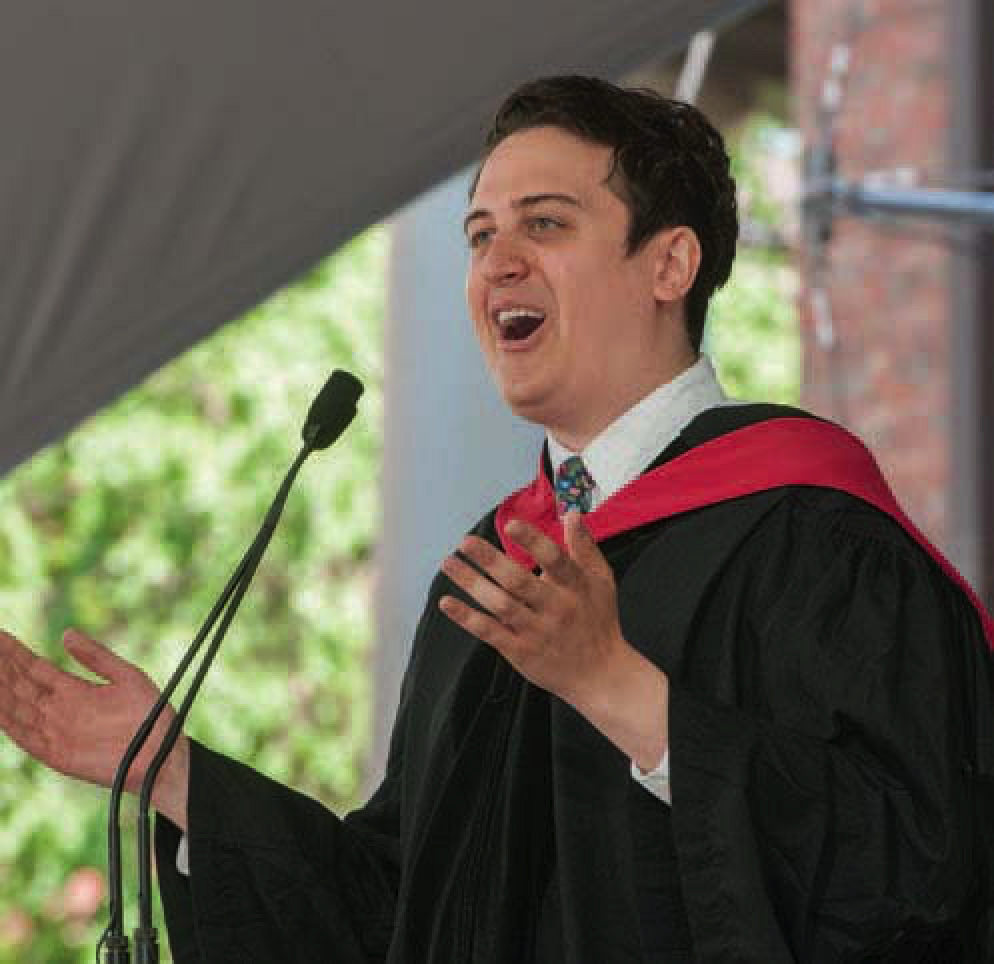
Pete Davis
Photograph by Jim Harrison
“It is not only the bomb or the bully that should keep us up at night—it is also the garden untilled and the newcomer unwelcomed, the neighbor unhoused and the prisoner unheard, the voice of the public unheeded and the long-simmering calamity unhalted and the dream of equal justice unrealized.”
Therein, perhaps, lay plenty of scope for hope engendered by the young, educated, newly graduated students of Harvard.
Finale—and the “Work Still Unfinished”
As the afternoon exercises ended, Bill Lee and Faust hugged—a tangible sign of the warmth, mutual respect, and close working relationship president and Corporation had forged during deeply challenging times—and a demonstration of the kind of relationship the Corporation and its president-elect, one of its own, no doubt hope to sustain. For as Faust noted, “as I step down from my responsibilities as Harvard president, I am keenly aware of another of hope’s fundamental attributes. It implies work still unfinished, aspirations not yet matched by achievement, possibilities yet to be seized and realized. Hope is a challenge”—in the world beyond the University, beyond Cambridge and Boston, perhaps more now than ever.
